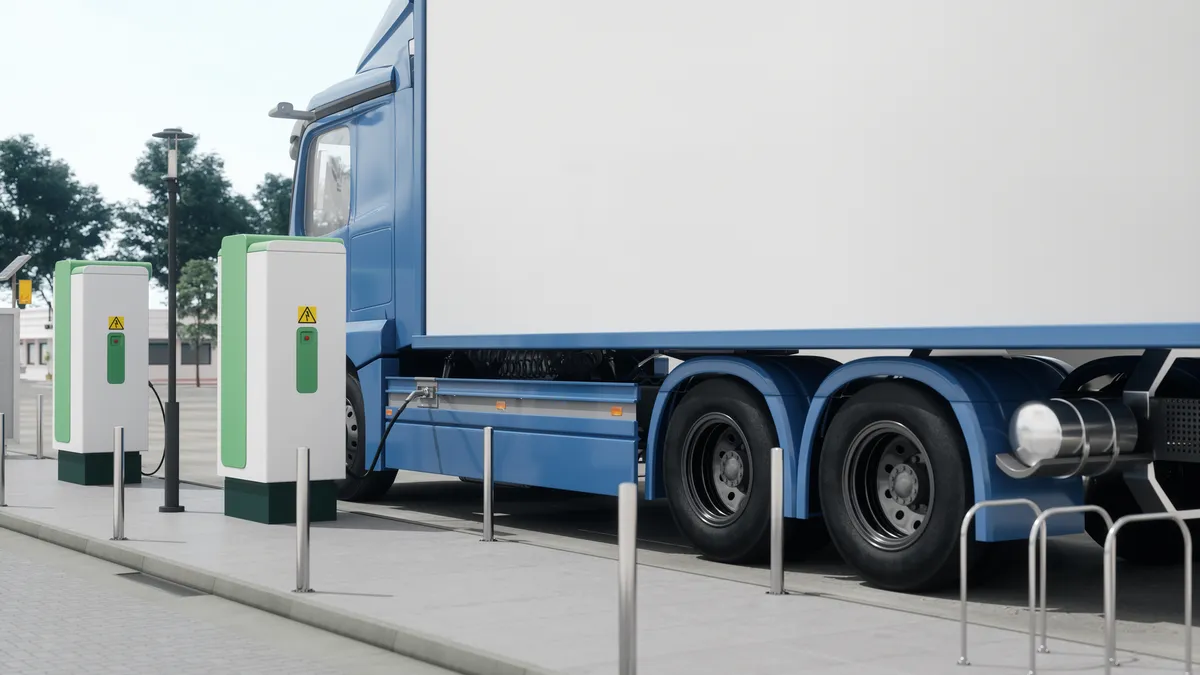Dive Brief:
- EV Realty and GreenPoint Partners are forming a $200 million joint venture to build out a network of high-powered, multi-fleet charging hubs for medium- and heavy-duty commercial vehicles in California and other key U.S. markets.
- The charging hubs will provide fleet operators with grid-optimized, large-scale hubs “located strategically near fleet operation centers,” the companies announced April 3. EV Realty’s multi-fleet charging sites, branded as Powered Properties, aim to optimize finite power resources and maximize uptime by enabling charging throughout the day, while avoiding the “punitive” peak electricity rates common in California by possibly using onsite batteries, EV Realty CEO Patrick Sullivan told Facilities Dive in an interview.
- Beginning with the first planned multi-fleet facility in Livermore, California, the joint venture’s initial rollout will focus on locations around the Phase 1 hubs identified in the Biden administration's National Zero-Emission Freight Corridor Strategy, Sullivan said.
Dive Insight:
Last year, the Biden Administration approved California’s proposal requiring “half of all garbage trucks, tractor-trailers, cement mixers and other heavy vehicles sold in the state” to be all-electric by 2035, the New York Times reported.
Under the state’s Advanced Clean Trucks regulation, 55% of smaller trucks and delivery van sales and 75% of “straight truck” sales, including buses, must be all-electric by 2035. Tractor-trailer sales must also account for 40% of the state’s total by then.
California’s state goals, along with fleet operators’ own decarbonization goals and “good old-fashioned economics,” mean that the state will likely have “a couple hundred thousand” medium- and heavy-duty electric vehicles on the road within a decade, Sullivan said.
“There is a clear and significant need for the EV charging infrastructure required to meet growing commercial demand,” GreenPoint founder and CEO Chris Green said in a statement. The California joint venture could “[serve] as a roadmap for ambitious commercial vehicle charging projects across the country,” Green added.
The joint venture is focused on serving “workhorse” commercial fleet operators, including local delivery providers, telecommunications service crews and heavy short-haul trucking firms, rather than long-haul trucking fleets, Sullivan said. To minimize local permitting delays and grid interconnection challenges, including the need for costly infrastructure upgrades, the joint venture aims to build hubs in industrial-zoned sites with adequate electrical service already in place, he added.
From the initial buying process through to construction and interconnection, Sullivan predicted that each multi-fleet site would take 18 to 36 months to deliver, with actual construction taking four to six months. That timeline is shorter than for other larger-scale clean energy projects due to the “grid-ready” site selection process, readily available charging components and a California law aimed at expediting local permitting for EV charging infrastructure, Sullivan said.
Once built, EV Realty will operate and manage the multi-fleet charging sites, according to the companies’ announcement. The third-party development and operation model has the added benefit of “no upfront capex for fleets,” Sullivan added.
That optimization process will require more real-world data, including “actual customers, vehicle profiles [and] dispatch schedules,” Sullivan said.













